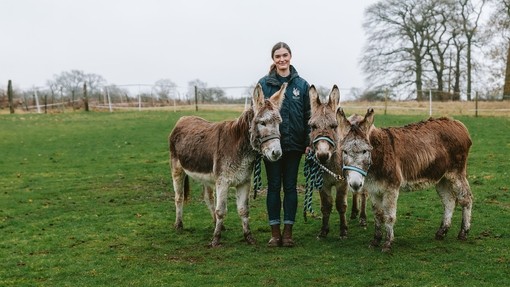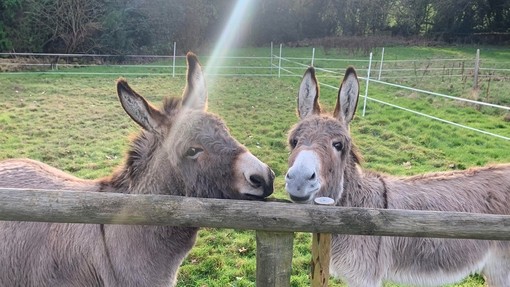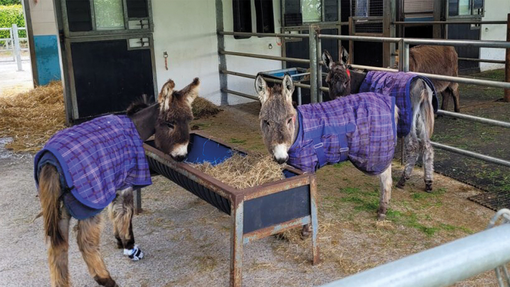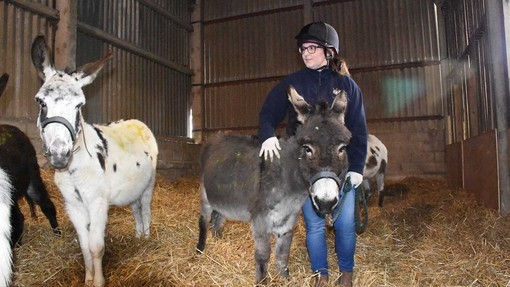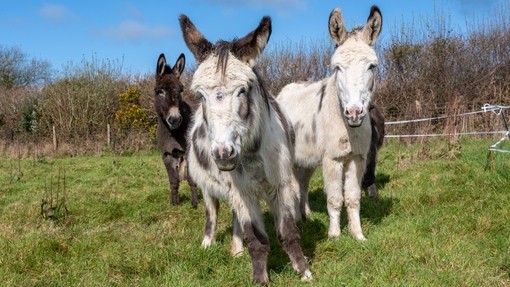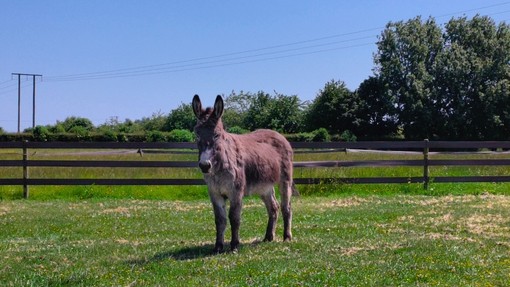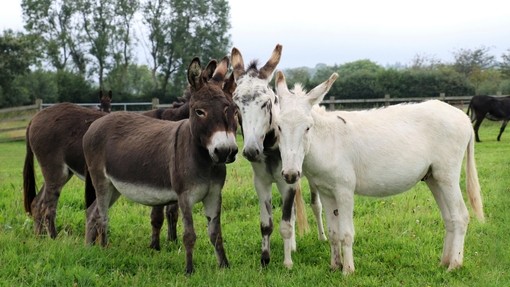
Rescuing five donkeys from North Devon
Dennis, Eliza, Lulu, Daisy and Geraldine were all brought to the attention of Donkey Welfare Adviser Jenna Goldby by a concerned member of the public in February.
After seeing the person’s photos of the donkeys, Jenna immediately knew they needed veterinary assistance. One of the photos showed a donkey unable to bear weight on its hoof.
Jenna says: “Good information, images and photos help us prioritise and prepare. In this case, I was grateful to the member of the public for their contribution as it briefed me on what to expect when I arrived at the site.”
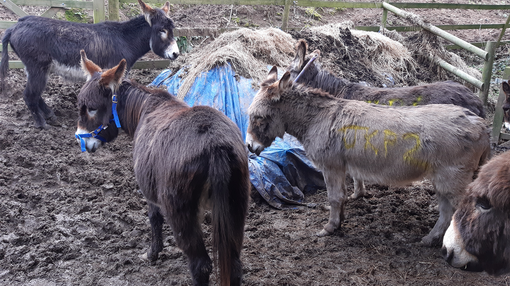
Assessing the situation
Jenna and Senior Donkey Welfare Adviser Sarah Kenward attended together and called the RSPCA for support.
Along with RSPCA Inspector Jo Pearson, they made their way up to the donkeys’ field, where they could see how poor their condition was first-hand.
Dennis, a two-and-half-year-old gelding, was uncomfortable on his feet.
Jenna says: “Dennis was not with the other donkeys, he was isolated by himself and laying down.
“Donkeys form very close friendships and bonds with each other, so for him to be away from the other donkeys was an indication that something was wrong.
“Donkeys will often choose to spend time in close proximity to one another. Changes to behaviour or a donkey who appears separate from a group can often indicate that there is an issue.
“Dennis was struggling to walk due to how uncomfortable he was, so chose to lay down by himself rather than trying to keep up with the herd who were mobile.”
Dennis was bonded with his mum Eliza, six, who had long hooves that were beginning to twist. She was also infested with lice.
Their companions were also suffering from various veterinary issues – seven-year-old donkey Daisy had hair loss on her neck caused by lice. Her hooves were also overgrown and twisting out.
Eight-year-old Geraldine was also infested with lice and her feet were long.
Jenna adds: “Another donkey, an eight-year-old grey-brown mare called Lulu, stood out to me.
“Not only was she the largest donkey in the group, but she was also the most nervous. Although she was inquisitive, she was very wary of us.
“Lulu’s feet were in an awful condition. Her hooves were the longest of all the donkeys, her toes had begun to lift up. The length of her hooves was forcing her into an abnormal stance.”
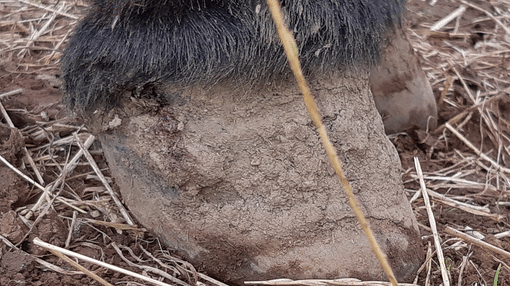
An ill-suited environment
Although all the donkeys’ body condition was reasonable, their environment was unsuitable for their needs.
Some of the fencing around their field was broken. There was no fresh water available and ragwort was growing in their field.
Ragwort is a yellow flowering plant containing toxic compounds that can cause liver damage to equines and other livestock animals, and in many instances can be fatal.
The donkeys’ field shelter was also falling apart and causing hazards. The donkeys roamed around near to splintered planks of wood with nails protruding outwards. Their hay was also mouldy.
“As a group, the donkeys all seemed very bright and inquisitive,” Jenna adds.
“They were friendly and interested in what we were doing but watching them walk on their rutted hill was horrible to witness.
“Dennis in particular was really struggling to manoeuvre the muddy, steep terrain.
“I knew these donkeys urgently needed to see a vet and a farrier.”
A bittersweet beginning
Today, Dennis, Eliza, Lulu, Daisy and Geraldine are thriving in sanctuary care. Sadly, a sixth donkey named Maude, who was also rescued on the day, was put to sleep as her health took a sharp decline shortly after she arrived at our New Arrivals Unit.
Maude, a 12-year-old mare who was bonded to Lulu, was infested with lice and had overgrown hooves when she was rescued. Her front right hoof was so long, it was beginning to twist.
After arriving at our Sidmouth site, Maude’s condition took a sudden turn, and she was rushed to our Brookfield donkey hospital in March with suspected colic.
Jenna says: “Sadly, Maude was diagnosed with colitis, an inflammation of the colon. Despite the best efforts of our veterinary team, it was decided the kindest course of action for Maude was euthanasia.
“Maude was peacefully put to sleep in the company of her loving grooms and companion Lulu.”
Following Maude’s passing, our grooms provided plenty of love and support to Lulu to help her cope with the loss of her friend and monitored her behaviour closely for any signs of hyperlipaemia.
Thankfully, Lulu has since started to show signs of a blossoming friendship with Eliza, and they will remain together as they continue their journey to recovery.

Herd in safe hands
Jenna adds: “This case showed the lengths that our teams will go to help donkeys in need.
“With our two full-time lorry drivers tied up elsewhere, four members of staff from other departments across the charity dropped what they were doing to drive the donkey transport vehicles to the donkeys’ field and safely drive them back to our New Arrivals Unit.
“They came out in the evening in the middle of the week, and they didn’t get home until late so I’m so thankful for their time and patience.
“This case brings home the reason why we are here. Our founder, Dr Svendsen, said donkeys come first second third, and in a crisis we have so many members of staff who will drop what they’re doing to offer support.
“I think Dr Svendsen will be proud of the staff we have working for us, and their commitment to donkeys.”
Today, Dennis, Eliza, Lulu, Daisy and Geraldine are leading happy, healthy lives at our Axnoller Farm site in Dorset.
Dennis and Eliza still share a special bond and are always seen side by side, while Geraldine and Daisy are also living contentedly in each other’s company. Lulu’s confidence grows each day, and we wait to see if she will build a lasting bond with a new friend.
Donkeys like Dennis, Eliza, Lulu, Daisy and Geraldine need you help
Share this page
Tags
- News

